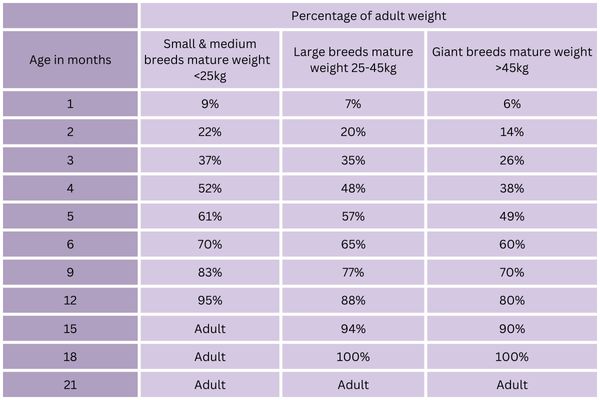
The nutritional requirements of a puppy are very different to those of an adult dog and these needs change as they grow and mature. Puppies go through multiple growth phases and it is important to meet their nutritional needs to help provide them with the best start to life.
Different sizes of dogs grow and mature at different rates. Smaller breed dogs tend to be fully mature by around 12 months of age whereas large and giant breeds do not mature until 18-24 months. Regardless of their size, all puppies go through a rapid growth spurt during the first few months and then this slows down.
The approximate ideal growth rates are shown below:

As a puppy grows, their energy requirements gradually reduce. When they are at 50% of their adult weight, they require 1.6 times more calories compared to an adult dog. This reduces to 1.2 times the energy requirement when they reach 80% of their expected weight.
Therefore, it is important monitor and adjust the amount of food as your puppy grows. The feeding guides provided by your food manufacturer are an ideal guide to follow. Just remember these are only a rough guide and should be adjusted to suit your individual puppy.
Feeding frequency
Puppies have very small stomachs but still need to meet their high calorie requirement so they should be fed multiple times a day during the intense growth phases. The following feeding frequency is recommended:
- From 8 weeks old, puppies should be fed 4 times a day
- At 10 weeks old, this can be reduced to 3 meals a day
- Once they are around 6 months old, the meals can be gradually reduced to twice a day
As they get older, your puppy may gradually lose interest in their lunchtime meal. If this happens it is fine to taper the meals to twice a day slightly earlier than 6 months.
Choosing the right food
At first it is best to keep feeding the food your breeder was feeding the puppy whilst they get settled. If you do decide you would like to change their diet, this needs to be done gradually over the course of a week to ten days to avoid an upset stomach. Offering your puppy a variety of flavours and textures (e.g. dry, wet, semi-moist) can help to prevent fussy eaters.
 As puppies have very different nutritional requirements compared to adults, it is important they are fed a complete puppy food that provides everything they need until they reach their adult weight. A puppy diet will be much higher in the nutrients required for growth – protein, fats and minerals such as calcium and phosphorus.
As puppies have very different nutritional requirements compared to adults, it is important they are fed a complete puppy food that provides everything they need until they reach their adult weight. A puppy diet will be much higher in the nutrients required for growth – protein, fats and minerals such as calcium and phosphorus.
Treats
Treats are really helpful for training your puppy. If using treats throughout the day, it is best to take an equivalent amount from their main meal to prevent overfeeding. It is recommended that no more than 10% of a puppies diet comes from treats as giving too many can also lead to nutritional imbalances.
There are lots of treats out there that can be given to your puppy. Some adult dog treats can be very rich and so not suitable for puppies. There should be information on the packaging which identifies the age they will be suitable from.
Bones and harder treats should be avoided until your puppies adult teeth have came through (around 7 months). Additionally, some chews can be too hard and can fracture adult teeth. You can check if a chew is suitable by pushing your thumb nail into the chew. If you are able to make an indent with your nail the this is safe for your dog but if you cannot make a mark then this potentially could be too hard.
Call us on 01435 864422 if you have any questions about your puppy’s nutritional needs.

